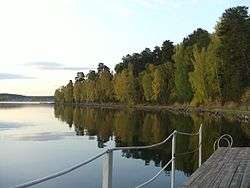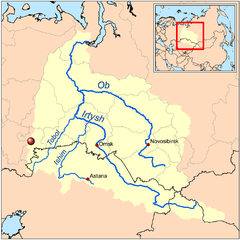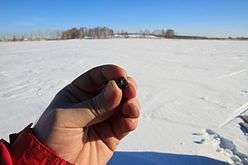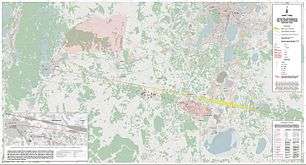Lake Chebarkul
Lake Chebarkul (Russian: озеро Чебаркуль) is a lake in Chebarkulsky District, Chelyabinsk Oblast, Russia, on the slopes of the southern Urals. The town of Chebarkul lies on its eastern shore, and Chelyabinsk, the administrative center of Chelyabinsk Oblast, is located about 70 kilometres (43 mi) to the northeast. The name of the lake, and the city of the same name, comes from Turkic and means "Beautiful, colorful lake."[2]
| Chebarkul Lake озеро Чебаркуль | |
|---|---|
 | |
 Lake Chebarkul located within the Ob River watershed | |
| Location | Chelyabinsk Oblast, Russia |
| Coordinates | 54.96°N 60.3294444°E |
| Primary inflows | Elovka River |
| Primary outflows | Koelga River, a small tributary of the Tobol[1] |
| Catchment area | 169 km2 (65 sq mi)[1] |
| Basin countries | Russia |
| Surface area | 19.8 km2 (7.6 sq mi)[1] |
| Max. depth | 12 m (39 ft) |
| Water volume | 0.154 km3 (125,000 acre⋅ft) |
| Surface elevation | 320 m (1,050 ft)[2][3] |
| Frozen | November until April |
| Islands | 7 |
| Settlements | Chebarkul |
Mostly fed by snowmelt from mountain streams, the lake freezes in November and stays icebound until April. The lake is the source of the Koelga River, which in turn flows into the Uvelka, Uy, Tobol, Irtysh, and Ob Rivers. The Ob finally empties into the Arctic Ocean.
There are several wooded islands, including Grachev, Golets, the Ribatskies, and Korablik Islands. The Krutik, Marin and Nazarychev peninsulas extend into the lake. Rest homes and sanatoria are located on the shores.[2] Lake Chebarkul is the largest of several lakes in the region, which collectively take on the name "Chebarkulsky lakes."
Fish that can be found in the lake include tench, carp, crucian carp, bream, pike, and perch.[2]
2013 Chelyabinsk meteorite impact
On 15 February 2013, local fishermen found a hole in the ice where a large fragment from the 2013 Russian meteor event likely struck the frozen lake.[4][5] The hole was circular, and about 6 metres (20 ft) across.[6] Police immediately cordoned off this site, as well as one other possible impact site in the area of the lake,[4] but scientists and interested people streamed to the area to investigate.[7]
In the days after the impact, black fragments of rock were found around the hole, which scientists from Ural Federal University suspect are meteorite fragments, and composed of about 10% iron.[8][9] Months later, divers found a large meteorite fragment on the lakebed, and it was dredged to the surface on October 16, 2013. This fragment weighed about 570 kilograms (1,260 lb).[10]
Gallery
 Scientists found meteorite samples on the ice of frozen Lake Chebarkul.
Scientists found meteorite samples on the ice of frozen Lake Chebarkul. The meteorite fragments are about 10% iron.[9]
The meteorite fragments are about 10% iron.[9] Map showing places where meteorite fragments were found, including Lake Chebarkul.
Map showing places where meteorite fragments were found, including Lake Chebarkul.
Further reading
- Detailed Russian-language map of the Lake Chebarkul region
- News story about the meteorite impact, which includes pictures of the impact site in Lake Chebarkul
- Photos of the meteorite fragments
References
- "Lake Chebarkul". State Water Register (in Russian). Archived from the original on 28 September 2013. Retrieved 17 February 2013.
- Official site of Chebarkul Archived 2011-09-03 at the Wayback Machine. Retrieved February 17, 2013. In Russian.
- Cherbarkul (Lake) - an article in the Great Soviet Encyclopedia. (In Russian, retrieved 2013-02-17.)
- "Meteorite hits Russian Urals: Fireball explosion wreaks havoc, over 900 injured (phots, video)". RT. Retrieved 15 February 2013.
- "Meteorite fell into Chebarkul lake – Russian governor". The Voice of Russia. 15 February 2013. Archived from the original on 18 February 2013. Retrieved 15 February 2013.
- Englund, Will (15 February 2013). "Meteorite injures more than 900 in Russian city". Washington Post. Retrieved 15 February 2013.
- "Chelyabinsk meteor lake to become a must-see". Voice of Russia, RIA, TASS, Interfax, RT. Retrieved February 18, 2013.
- "Stay away from meteorites, government tells Russians". Space Daily. Moscow. AFP. 15 February 2013. Retrieved 17 February 2013.
- Kramer, Andrew E.; Barry, Ellen (February 18, 2013). "Russian Scientists Say They Found Meteorite Fragments". New York Times. Retrieved February 18, 2013. News story contains photographs of meteorite fragments.
- "Huge half-ton chunk of Russian meteorite lifted from lakebed". 16 October 2013. Retrieved 13 November 2013.
| Wikimedia Commons has media related to Lake Chebarkul. |